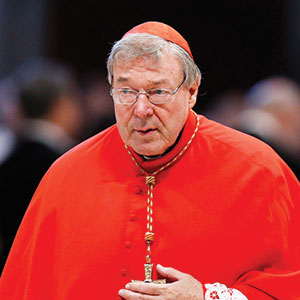The scale of the challenge facing Pope Francis in his reform of the Vatican has burst into the open after an audit of its finances was controversially suspended amid a growing internal power struggle at the heart of the Church.
For the first time, a globally recognised accountancy firm, PricewaterhouseCoopers (PwC), had been commissioned to go through the books of all Holy See entities. But just a few months into the job, the firm’s work was dramatically suspended by a senior official at the Secretariat of State, who raised procedural questions over PwC’s contract including the fact it had been signed by Australian cardinal George Pell (pictured), the Pope’s treasurer.
Archbishop Angelo Becciu, who runs internal affairs for the Vatican, sent a letter this month to Holy See departments stating that PwC’s work had been “suspended immediately”, later telling Catholic Television network TV2000: “We realised the contract should have been drawn up by the Council for the Economy rather than the body that did so.”
But sources close to Pell, who heads the Secretariat for the Economy (overseen by the Council for the Economy) issued a rebuttal of Becciu’s claims. They stressed that the audit committee of the Council for the Economy – the body which oversees all financial activity of the Holy See and is led by German Cardinal Reinhard Marx – had also signed the estimated $3 million (£2 million) contract with PwC. A spokesman for Pell said he was a “bit surprised” by the suspension of PwC’s work but expected it to resume shortly. On Thursday last week, the cardinal saw the Pope and the audit was discussed.
Francis was elected by his fellow cardinals with a mandate to clean up the Vatican and bring an end to scandals that had dogged Benedict XVI’s papacy.
He appointed both Cardinals Pell and Marx to a new Council of Cardinals advisory body and that group, which also includes Cardinal Pietro Parolin, the Secretary of State, discussed the Vatican audit at their meeting earlier this month. Cardinal Marx and Cardinal Pell were reportedly not in agreement on the matter and when asked by The Tablet about the suspended audit a spokesman for Cardinal Marx declined to comment.
The overruling of Cardinal Pell by Archbishop Becciu has also revealed a power struggle between the Secretariat of State, traditionally the most powerful Vatican department, and Pell’s new economy body that the Pope has put in charge of finances. Pell, known for his combative style, is under fire from the old guard as he has insisted on rigorous budgeting and transparency for all Roman Curia departments who for years have been accustomed to operating as separate fiefdoms with little accountability.
He has not, however, managed to wrestle oversight of all Vatican money including the financial powerhouse that is APSA, a body which manages properties in Rome and elsewhere in Italy, investments, and pays the salaries of Holy See employees. APSA works under minimal oversight and last November Vatican investigators said they suspected an Italian banker of using his APSA accounts for money laundering, insider trading and market manipulation. While Becciu has let it be known that the Secretariat of State is in favour of greater transparency his department has raised concerns about whether the Vatican can be audited in the same way as a multinational corporation. In the past, the finances of the Holy See have been audited by an Italian firm, but under new statutes issued by the Pope the Council for the Economy was given power to choose external accountants and to investigate suspected mismanagement.
This was part of sweeping changes to finances that Pell spearheaded including new management of the Institute for the Works of Religion (IOR), known as the Vatican Bank. The IOR is led by French banker Jean-Baptiste de Franssu but Italian newspaper ItaliaOggi reported that he would be replaced soon.
It also said that Pell, who must offer his resignation to the Pope in June when he turns 75, will leave his post.
The Vatican issued a statement on Tuesday insisting that the PwC suspension was not due to the “integrity or quality of its work” or “the intention of one or more entities of the Holy See to block the reforms in progress”.
28 April 2016, The Tablet
Power struggle threatens Francis’ reforms
 Loading ...
Loading ...
Get Instant Access
Subscribe to The Tablet for just £7.99
Subscribe today to take advantage of our introductory offers and enjoy 30 days' access for just £7.99



